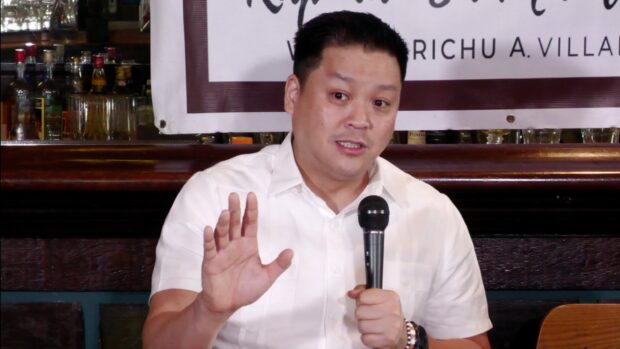DSWD readies food cards with P3,000 credits per month

DSWD Secretary Rex Gatchalian at the ‘Kapihan sa Manila Bay’ June 7, 2023 (Photo by RYAN LEAGOGO / INQUIRER.net)
MANILA, Philippines — Farmers will be a priority in the Marcos administration’s food stamps program, as it seeks to prioritize buying food items from the government’s Kadiwa stores, the Department of Social Welfare and Development (DSWD) said on Wednesday.
At a news forum, Social Welfare Secretary Rex Gatchalian also announced that the pilot testing of the food stamps program will take place sometime this year in select areas that were affected by conflict and natural disasters.
These areas include the Bangsamoro Autonomous Region in Muslim Mindanao, the Caraga region, and either a mountainous or island municipality in the country.
“The department will be putting in some innovations on the program—first is that our [food stamps] will be digital,” he told reporters during the Kapihan sa Manila Bay forum in Manila.
Gatchalian said the Philippine government will be working with the World Food Programme for the digitization of the food stamps through the production of cards that can be used in several food retailers like in groceries, Kadiwa stores, or other shops.
Article continues after this advertisementThere will be P3,000 worth of food credits per month to be given in each card and there will be choices of food baskets containing food items, which can be obtained through the card.
Article continues after this advertisement“In the language of the president, food as currency,” Gatchalian noted.
Pilot run
He said the Asian Development Bank has provided a $3 million grant for the pilot run of the food stamps program. It will target around 3,000 families in different municipalities for the pilot test.
The pilot testing, Gatchalian added, will also seek to help farmers in urban areas, as he noted that the food items to be sold via food stamps will be purchased from Kadiwa stores, which have been opened in various areas in the country.
“[The food stamps program] is not a dole-out program. We have to look at it as an investment to human capital … our greatest resource is our people,” he said. “If we don’t invest in our people while the economy is doing good, the gap between the rich and the poor would only grow bigger.”
“So, we have to make sure that while the economy is doing good, our people should also be ready in facing this because if not, we will only be like in other countries wherein there are plenty of jobs but our people cannot meet this,” Gatchalian said.